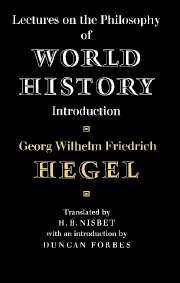Book contents
- Frontmatter
- Contents
- Introduction
- Translator's preface
- Georg Wilhelm Friedrich Hegel Lectures on the Philosophy of World History Introduction: Reason in History edited by Johannes Hoffmeister
- Preface
- FIRST DRAFT (1822 and 1828)
- SECOND DRAFT (1830)
- APPENDIX
- Note on the composition of the text (by Georg Lasson)
- Notes to the First Draft
- Notes to the Second Draft
- Notes to the Appendix
- Suggestions for further reading
- Index of names
- Index of subjects
APPENDIX
Published online by Cambridge University Press: 05 June 2012
- Frontmatter
- Contents
- Introduction
- Translator's preface
- Georg Wilhelm Friedrich Hegel Lectures on the Philosophy of World History Introduction: Reason in History edited by Johannes Hoffmeister
- Preface
- FIRST DRAFT (1822 and 1828)
- SECOND DRAFT (1830)
- APPENDIX
- Note on the composition of the text (by Georg Lasson)
- Notes to the First Draft
- Notes to the Second Draft
- Notes to the Appendix
- Suggestions for further reading
- Index of names
- Index of subjects
Summary
General determinations
The universal premise of this investigation is that world history represents the Idea of the spirit as it displays itself in reality as a series of external forms. The stage of self-consciousness which the spirit has reached manifests itself in world history as the existing national spirit, as a nation which exists in the present. Consequently, this stage of self-consciousness exists within time and space, and its mode is that of natural existence. The particular spirits which we have to consider in their simultaneous and successive existence are particular, because each of them has its own determinate principle; and each world-historical nation has the functions of a distinct principle allotted to it. It must admittedly pass through various principles in its own right in order that its distinct principle may attain maturity; but in world history, it always retains a single form. It may well occupy several positions in the course of its historical existence; but it can never command the first place in world history in more than one of these. On the contrary, it is eventually assimilated into another principle which, since it is itself original, is incompatible with the former one. But every particular national principle is also subject to natural determinants, so that it also appears as a natural principle. The various national spirits are separated in time and space; and in this respect, the influence of the natural context, the relationship between the spiritual and the natural (i.e. the national temperament, etc.) makes itself felt.
- Type
- Chapter
- Information
- Lectures on the Philosophy of World History , pp. 152 - 220Publisher: Cambridge University PressPrint publication year: 1975

